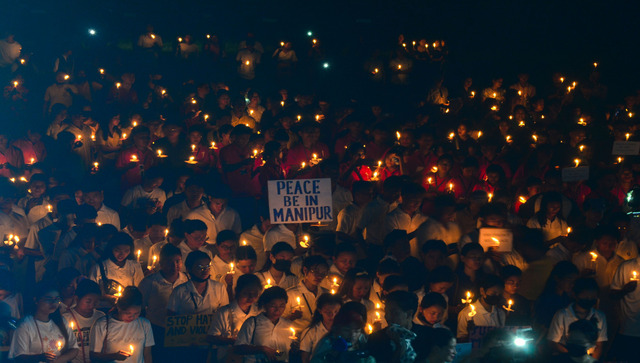Unrest has gripped Manipur for months after deadly ethnic violence broke out on 3 May between Meiteis and tribal Kukis. Tensions have remained high in the northeastern state since then. As per official figures by the Manipur Police, at least 175 people have died, 1,118 were injured and 32 people are missing since the clashes erupted. Now, a Supreme Court-appointed panel has accused civil society organisations of keeping the pot boiling by applying “pressure” on the victims’ families to not accept their kin’s bodies for last rites. What has the Supreme Court-appointed committee said? What is going on in Manipur? Let’s take a closer look. Panel’s report on Manipur conflict The SC-appointed panel, headed by former Jammu and Kashmir High Court Chief Justice Gita Mittal, has accused civil society organisations of preventing the cremation of 88 bodies lying unclaimed in Imphal mortuaries, as per Times of India (TOI). The three-member committee also includes former Delhi High Court Judge, Justice Asha Menon, and ex-Bombay High Court Judge, Justice Shalini P Joshi. Tasked with examining the humanitarian aspect of the ethnic clashes, the panel submitted its 13th interim report to the apex court last week, reported Indian Express. As many as 94 unclaimed bodies, of which six remain unidentified, are preserved in three mortuaries in the state – JNIMS and RIMS in Imphal, and the Churachandpur District Hospital. The committee said civil society organisations (CSOs) in Manipur were “exerting tremendous pressure” on relatives not to claim these bodies. [caption id=“attachment_13439682” align=“alignnone” width=“640”] Kuki people look at the pictures of those they say have died in ethnic violence, at a protest site in Churachandpur district on 22 July. Reuters File Photo[/caption] The panel in its report alleged that “some CSOs are opposing and obstructing the performance of last rites by relatives on account of vested interests, and even in order to derive mileage and to compel authorities to meet unwarranted demands”, reported TOI. It referred to an incident on 3 August when the Indigenous Tribal Leaders’ Forum (ITLF) tried to conduct a burial of 35 bodies in Torbung, in the Churachandpur district. The Central government had then intervened and asked ITLF to postpone the funeral. The Manipur government had also suggested nine other burial sites, as per Indian Express. “Unfortunately, the CSOs are insisting on mass burials at unsuitable spots, which will serve as a source for constant mounting of tension between communities in Manipur and prevent restoration of normalcy,” the panel reportedly said. The committee said the top court should direct CSOs not to interfere in the victims’ kin accepting ex gratia and claiming their bodies. It urged the Supreme Court to direct the relatives to accept the bodies to perform the last rites and said the court should “prohibit” civil society organisations from obstructing the kin from doing so, as per Indian Express. The panel recommended that authorities should be asked to perform the last rites in case the bodies were not accepted by relatives within a certain time, according to TOI. What’s the latest in Manipur? Manipur chief minister N Biren Singh recently told the news agency PTI that his government is holding talks with an “insurgent group” in the state and a peace deal is in the works. “We are advancing, and we are expecting to sign a peace accord with one big UG (underground organisation) very shortly,” he said. Sources told PTI earlier that the state government was negotiating with a faction of the banned United National Liberation Front (UNLF). Singh also said some people from
Myanmar who have crossed into
Manipur fleeing violence in their country are being given shelter in the state on humanitarian grounds. “However, they will be deported once the situation is stable in Myanmar,” he told the news agency. Around 2,500 people from Myanmar have fled to Manipur since July. [caption id=“attachment_13439692” align=“alignnone” width=“640”]
Unrest has gripped Manipur since May. PTI File Photo[/caption] Meanwhile, a key Kuki group suspended its 12-day “economic blockade” of two national highways connecting the Meitei-dominated Manipur capital of Imphal. The Committee on Tribal Unity (COTU), which is based in Kuki-majority district of Kangpokpi, had imposed the blockade on 15 November to protest against the “indifferent attitude of the concerned authority in dispensing law and order in Kuki-Zo inhabited areas”, reported Hindustan Times (HT). The group said it will review the move and implement the blockade again if needed. Some Kuki-Zo groups have been calling for a separate administration for the tribal areas accusing the state and the Centre of failing to tackle the ethnic violence. With inputs from agencies
A Supreme Court-appointed panel has accused civil society organisations of exerting ‘pressure’ on the victims’ families to not accept their bodies for last rites. As many as 94 bodies are lying unclaimed in three mortuaries in the conflict-ridden state
Advertisement
End of Article


)

)
)
)
)
)
)
)
)



